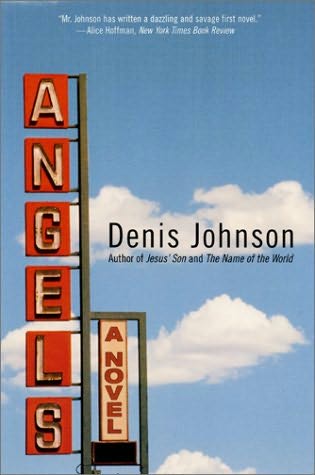Angels
 One down, nine to go in my bid to resist consumerism. (I even managed to enter a bookstore today, pick up the new Richard Russo novel, and leave without buying it. I'm exhausted from the effort.)
One down, nine to go in my bid to resist consumerism. (I even managed to enter a bookstore today, pick up the new Richard Russo novel, and leave without buying it. I'm exhausted from the effort.)Angels by Denis Johnson was a hell of a way to start my checklist, one of the most original novels I've read, poetic but propulsive (an endangered combination). It's also heartbreakingly sad and suddenly funny, leaving you feeling like you might if you listened to the dialogue from Raising Arizona while strolling through an exhibit of Dorothea Lange photos.
Johnson's new, sprawling novel, Tree of Smoke, is getting a lot of attention, and I wanted to read Angels (his debut, from 1983) and reread Jesus' Son (1992) before I eventually tackle it.
The story centers on Bill Houston (always referred to by first and last name in the novel), an ex-Navy man, one of three brothers who are troublemakers mostly because they're a bit too dim to be anything else, and Jamie Mays, a mother of two young children fleeing an abusive husband in California. The two meet on a cross-country bus, making their way to the Rust Belt before heading back west to spend time with Bill Houston's family in Arizona.
Here's a sense of the book’s humor, in a scene when the two are wandering around Pittsburgh:
Horrible gargoyles jutted from the walls around them. They moved along the sidewalk under the streetlamps, among the headlights, and Jamie shouted over the traffic noise, "Well I don't care if it is far. Let's us just go to Philadelphia. I never been there either. I never been any goddamn place."Johnson has a perfect instinct for when to leaven the grit with a laugh, but he doesn't flinch when his hardscrabble, self-destructive characters get themselves into trouble. Jamie's encounter with a con man in Chicago leads to her being drugged and raped, and the reader sees the danger of her trusting him long before she does. Soon after that attack, Bill Houston tracks her down, and Johnson again exhibits an uncanny ability to mix tones:
"Now in my estimation," Bill Houston said, "there just ain't nothing in Philadelphia.”
"Liberty Bell's something, ain't it? You going to tell me it's just nothing, just because it's in Philadelphia and you say there ain't nothing there?"
"The Liberty Bell ain't nothing to do. Ain't even anything to talk about. Talk about something else.”
"It ain't so far to Philly," she said. "What about our forefathers?"
He began to draw ahead of her, a stranger to this woman a bit behind and to the left of him. "I would love to see the Washington Monument because it doesn't piss around. It's tall. One other thing is those four big statues of faces carved out of a mountain. But they ain't neither of them in Pittsburgh or Philly. Only thing in this state's the Liberty Bell, and that's just a bell -- know what I mean? A bell."
He found her at the Children's Services Division in the afternoon, napping in a chair of torn-and-taped imitation leather. Baby Ellen lay in her lap, and a few chairs away Miranda disputed with a little baldheaded boy about the possession of a coloring book. The place smelled like an ashtray. Everybody was black or foreign or deformed. There were people with crutches and people clutching soiled magazines to their chest, and children all around them. He leaned close and said, "Jamie," hoping he was being quiet enough.I'll leave you with just one more excerpt, because it's one of my favorites, and I want to make it as clear as possible that you should read this book. (As for me, I'm almost done with my rereading of Jesus' Son, a brief collection of linked short stories, including a gem called "Emergency." Then it's back to the official list of ten with The Bookshop by Penelope Fitzgerald, a slight thing that shouldn't take more than a day or two.)
When she opened her eyes she said, "I been looking for you."
"Well, you found me. How about us getting out of here?"
"I got to fill out some more forms, I think." She looked around, apparently trying to locate herself among these others.
"Shit. Once they start you on filling out forms, it just don't ever end.” He tried to think of a way of explaining to her that even now, as the two of them dawdled here, these people were inventing the forms that would defeat her grandchildren.
Here's Jamie again, speaking to a panel of four people, trying to prove her sanity, hoping to be released from a psychiatric ward, where she's had delusions, among other things (thus the comment about the Empire State Building):
"How are you feeling today?" the Welfare lady asked.
"Nervous," Jamie said.
Nervous was the wrong word. She could see that instantly.
"I mean, I have my problems," she said, "but I don’t think this is the Empire State Building, or anything like that."
They shifted in their seats.
"You're just nervous about being here," Dr. Wrigley said.
"You got it," Jamie said.
Everybody nodded. When she said the wrong thing, the bodies shifted. When she said the right thing, the heads went up and down.
Dr. Wrigley wasn't the only man with a chart. There was another, Dr. Benvenuto, who flipped his pages and said, "Jamie, what do you see yourself doing ten years from now?"
She closed her eyes and it came before her like a vision. "I'll be watching a color TV and smoking a Winston-brand cigaret."
That made their heads go up and down wildly. They loved that one.


0 Comments:
Post a Comment
<< Home